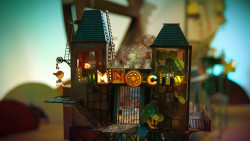
 Review Fix chats with State of Play Games’ Luke Whittaker who discusses their nifty iOS puzzler “Lumina City.†Inspired by games the likes of “Shadow of the Colossus†and featuring a beautiful and unique art style, Whittaker discusses what else makes the game a special one.
Review Fix chats with State of Play Games’ Luke Whittaker who discusses their nifty iOS puzzler “Lumina City.†Inspired by games the likes of “Shadow of the Colossus†and featuring a beautiful and unique art style, Whittaker discusses what else makes the game a special one.
For more on the game, click here.
Review Fix: What made the development of this game special?
Luke Whittaker: The most obvious answer is that the whole game environment was created by hand, from paper, cardboard, miniature lights and motors, and then filmed. That entire creative process was special, and we were careful to build a working environment where we could experiment with technology to make that happen. And to me, almost everything was special about making this game. It was a highly personal project where we could really push our ideas to the limit.  It was special because we collaborated in new ways, with architects, modelmakers and photographers, and made great friends with some incredibly inspiring people. It was special because we feel we’ve created something we really can say we love.
Review Fix: Who do you think will enjoy it the most?
Whittaker: This game really is for everyone.  We didn’t aim to target it at any particular demographic, it’s been created whilst thinking of the things we loved throughout every stage of our lives. There are things in there which should appeal to all ages, my toddler loves just running around all the environments for example, and we’ve also had people in their 80s getting in touch saying how much they loved the adventuring and the puzzle solving.  With the addition of those puzzles, it’s a great game to play as a family. Older kids and adults can help out with the trickier puzzles, younger ones can enjoy the ride.
Review Fix: Any thoughts on an eventual console release?
Whittaker: There are some plans in the works, and we’re looking into the feasibility right now. We’ve got a couple of other games ideas in the works too, and these will probably come out before a console release.
Review Fix: Why do you think puzzle games still matter?
Whittaker: I think they’ll always matter. We all love to be mentally challenged, and I think the audience for this kind of this is getting bigger not smaller as more demographics start playing.  I’d go as far as saying that puzzles can be part of what makes a game art. I’ve been thinking of Shadow of the Colossus again recently, which is part action game, part puzzle game, as you work out how to scale these huge colossi. Outwitting and then killing these apparently sentient beings is part of the struggle which gives the game its incredible power.
Review Fix: What games directly inspired this one?
Whittaker: Shadow of the Colossus definitely played a part, I wanted you to feel the awe you experience when faced with scaling something grand and inexplicable, except instead of trying to reach the top of colossi here you’re scaling a huge city. There are occasions where we’ve capitalised on what a camera can do to enhance this, focussing on the very top of the city from below, or sweeping down through the city as your character slides down a rope. Other puzzle adventures were big influences too, Samarost and Machinarium for example, as well as the classics like Monkey Island we grew up with.
Review Fix: Bottom line, why should someone play this game?
Whittaker: Because you won’t have seen anything like it before. And because, I think, you might just fall in love with it.
Review Fix: What’s next?
Whittaker: There’s a big game we’ve got ideas for which I can’t say too much about yet, but we’re also working on two smaller titles for release in 2016. One of which is based on our hit puzzle game KAMI which has been a great success on iOS and Android. It’s good for us to work on a few projects around the larger ones, it’s good commercially and good for our sanity. The big ones like Lumino City really take it out of you, you give them everything.



Leave a Reply